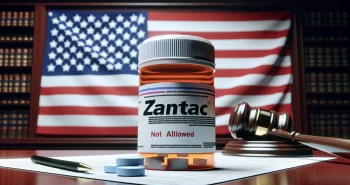Zantac Use: Who Can File a Lawsuit

Should I be worried if I took Zantac? Many patients who used Zantac and later experienced health problems may qualify to file a lawsuit. This page explains who can file, what evidence is needed, and steps to seek compensation. It is intended for potential claimants, not as medical advice.
These reported health problems may make patients eligible for a Zantac lawsuit, depending on their exposure and diagnosis.
The FDA made the big call to pull Zantac in April 2020 because of this scare. The aim? Tackling the probable NDMA contamination. It wasn’t just a shot in the dark; this stuff is a confirmed cancer-causer in animals and likely not great for humans. It’s a wake-up call shaking up how safe we thought Zantac was and making us rethink its use given the potential health bombs it’s throwing.
With these recent events and the data on NDMA’s cancer link, it’s pretty darn crucial for anyone who took Zantac to have a reality check. Understand the health risks linked to Zantac, the cancer types associated with it, and any side effects that might have snuck up on you.
With such a hefty issue at hand, it’s time to get serious about the Zantac conundrum, the actions you need to take if you’ve used it, and what legal steps you can explore if it’s left you high and dry with its effects. Up next, we’ll dig into why Zantac got the boot, the health risks involved, and what your go-to moves should be if this health pickle involves you.
Table of Contents:
Legal Background on Zantac Recalls
Zantac, also known as ranitidine, got pulled off shelves due to serious safety worries and health risks tied to its use. Let’s break down the main reasons, especially spotlighting FDA findings on Zantac contamination and the concerning connection between Zantac and cancer.
Reported Legal Cases Involving Zantac
Back in April 2020, the FDA didn’t waste time— they demanded all prescription and over-the-counter ranitidine, or Zantac, to be yanked from stores. This move came after discovering N-Nitrosodimethylamine (NDMA) in Zantac. Now, NDMA is a big deal because it’s a known cause of cancer.
The FDA took action because they found evidence that NDMA levels in these products went over the safety limit, especially when not stored in cool conditions. This was a major concern for folks using Zantac for acid reflux and heartburn.
Who Can File a Zantac Lawsuit?
Zantac’s connection to cancer was a huge reason behind all the recalls and lawsuits against big companies like Pfizer, Sanofi, and Boehringer Ingelheim. By mid-December 2022, more than 2,000 lawsuits were already in play in Florida, with people claiming various cancers from using Zantac.
One groundbreaking study found that ranitidine, Zantac’s active ingredient, could cause stomach conditions to naturally whip up high NDMA levels. This was far beyond what the FDA considered safe. In some cases, a single tablet could produce about 304,500 nanograms (ng) of NDMA. This realization drove the urgent need to stop selling Zantac for good.
The clear cancer risk tied to NDMA in Zantac highlights the serious health threats from this common medication. People who took Zantac should keep an eye on their health and talk to a doctor if they’re worried about any side effects. Thinking about legal action over Zantac-related health problems? You’ll want to check if you fit the bill for a Zantac lawsuit and understand how to pursue compensation.
Should I Be Worried If I Took Zantac?
Wondering if taking Zantac was a bad move? Let’s break down the risks based on how much and how long it was part of your daily routine. Plus, we’ll look at who might need to pay a bit more attention to possible side effects.
Eligibility Factors for a Zantac Claim
Legal eligibility can depend on dosage and duration of Zantac use; a lawyer can review your situation to see if you qualify for a claim. Bigger doses or long-term use mean you might be on a higher risk train for those unwanted side effects. If Zantac was your go-to for a long time or in heavy doses, having a chat with a healthcare professional is a wise step. They’ll give you the lowdown on what it means for your health and what other treatments are out there.
Who May Qualify for a Zantac Lawsuit?
Some folks are on a higher risk radar when it comes to Zantac. People with certain health issues, a weakened immune system, or a cancer history might want to tread carefully. Older folks and those expecting should take an extra pause and possibly drop by their doctor’s office if Zantac was once on their medicine shelf. It’s all about keeping a check on those health matters.
Given the recalls and legal chatter around Zantac, like a slew of lawsuits blaming it for causing cancer, it’s pretty smart for anyone who’s popped Zantac to stay in the loop and check out their risk factors. A sit-down with a healthcare pro will help tailor what’s best, possibly switching to other options like Proton Pump Inhibitors (PPIs) – think Prilosec or Nexium – to ease any lingering worries Zantac might’ve left behind.
Reported Claims Related to Zantac Use
Let’s get into the nitty-gritty of what’s going on with Zantac and why it’s been raising eyebrows. This medication, once a go-to for heartburn relief, has gotten tangled up in lawsuits (a lot of them!) because its use is linked with cancer and some nasty long-haul side effects. We’ll break down what you need to know about the types of cancer linked to Zantac and the not-so-friendly side effects people are talking about.
Legal Cases by Condition Reported
So, what cancers are we talking about here? Zantac has been put under the legal microscope because it contains NDMA (N-Nitrosodimethylamine), a substance you definitely don’t want in your system. Here’s a list of cancers that have popped up in conversations around Zantac:
| Cancer Types |
|---|
| Stomach Cancer |
| Intestinal and Colon Cancers |
| Esophageal Cancer |
| Kidney Cancer |
| Bladder Cancer |
| Liver Cancer |
| Prostate Cancer |
| Pancreatic Cancer |
| Leukemia |
| Non-Hodgkin’s Lymphoma |
| Multiple Myeloma |
If you’ve popped Zantac pills and ended up with one of these diagnoses, it’s worth looking into whether you’re owed some compensation for what you’ve gone through.
Reported Legal Complaints
Cancer’s not the only plot twist here; Zantac has some other tricks up its sleeve. Here’s a rundown of what else could make your life a headache (in more ways than one):
- Gut Gone Wild: Think about problems like diarrhea, constipation or a belly that just won’t quit grumbling.
- Liver Troubles: Using Zantac over a longer spell could mean bad news for your liver’s workbench.
- Heart Drama: Some folks have found their heart doing the tango with irregular beats or indicating road signs toward heart disease.
- Mind Games: Dizziness, confusion, or pounding headaches have all been reported, showing up uninvited.
If you’ve been thin on the ground from Zantac’s shenanigans, give a holler to your doctor. Chatting through any weird symptoms with them is a good idea. Catching things early with regular check-ups can make all the difference.
Given all the drama, having a grasp of how Zantac can mess with your health is key for staying on top of your game. If this hits close to home for you, it might be time to ring up a Zantac lawyer to get the lowdown on filing a lawsuit to cover your losses.
Legal Options for Zantac Users
Thinking about what to do if you’ve taken Zantac and it’s made you sick? Maybe you even got a cancer diagnosis after using it. You’re not alone, and there’s a path you can take to find justice and maybe even get some compensation for what you’ve gone through.
Who Qualifies for a Zantac Lawsuit?
So, have you taken Zantac and ended up with health issues, particularly cancer? You might have a case against the companies that made this stuff—big names like Pfizer, Sanofi, and Boehringer Ingelheim. These companies are knee-deep in lawsuits because of Zantac’s recall and market withdrawal.
Even GlaxoSmithKline (GSK), another giant in the drug world, is planning to reserve up to $2.2 billion to settle around 80,000 Zantac lawsuits, aiming to address a whopping 93% of the ones that are still up in the air. They’re finally taking steps to pay back folks who suffered because they used Zantac.
File a Claim for Compensation With Legal Claim Assistant
Did Zantac do more harm than good? If cancer or other health issues popped up after using it, you’ve got the right to ask for compensation. And trust me, having a smart legal team by your side makes all the difference when you’re dealing with a Zantac lawsuit.
There are thousands of lawsuits already in action, talking about the nasty long-term effects of ranitidine drugs, like Zantac. The companies and even the FDA didn’t really let on about these risks, which means people like you were unknowingly put in harm’s way.
Taking a stand and filing for compensation means you’re not just looking out for yourself but also holding those negligent folks accountable. Getting some legal advice can arm you with the info you need, help you push for damages, and shine a light on the dangers of Zantac use. You can make a difference and maybe prevent others from going through the same ordeal.










